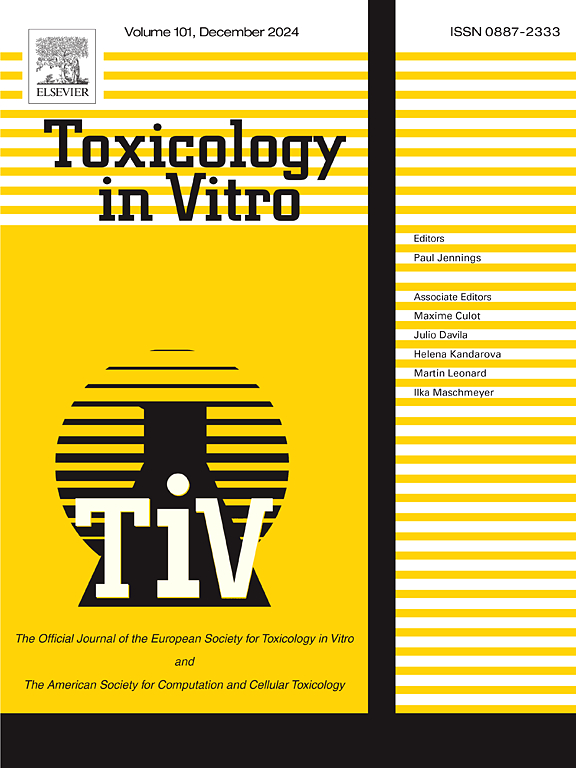使用Pred-skin 3.0-A网络预测工具预测农药的皮肤致敏潜力。
IF 2.6
3区 医学
Q3 TOXICOLOGY
引用次数: 0
摘要
由于农业和园艺需求的增长,农药的使用量正在增加。职业性皮肤暴露于农药的急性或慢性低水平可导致接触性皮炎和各种皮肤癌。因此,有必要详细了解不同类别农药背后的不良后果途径(AOP)或化学致敏途径(CSP)。由于物种间的差异,皮肤致敏试验的动物模型有时会超出或低于对人类反应的预测。这就需要各种化学物质的皮肤致敏潜力的预测工具。Pred-skin 3.0是一个共识Naïve基于贝叶斯模型的预测工具,它利用各种人类,LLNA和非动物数据来预测皮肤致敏性。虽然,这个工具从未被用于预测农药的皮肤致敏潜力。因此,本研究旨在测试该预测工具在预测三大类96种农药的皮肤致敏潜力方面的适用性。Pred Skin预测工具的贝叶斯结果与现有动物皮肤致敏数据的一致性为72.72 %,与非致敏数据的一致性为63.46 %。本文章由计算机程序翻译,如有差异,请以英文原文为准。

Predicting the skin sensitizing potential of pesticides using Pred-skin 3.0–A web-based prediction tool
Pesticide usage is increasing due to growing needs of agriculture and horticulture. Occupational dermal exposure to pesticides at an acute or chronic low-level could result in contact dermatitis and various skin cancers. Hence, detailed understanding about the Adverse Outcome Pathways (AOP) or Chemical Sensitization Pathway (CSP) behind pesticides belonging to various categories has to be investigated. Animal models of skin sensitization testing at times either over or under predict the human responses due to species-to-species variability. This necessitates the need for prediction tools for skin sensitizing potential of various chemicals. Pred-skin 3.0, is a consensus Naïve Bayes model-based prediction tool which utilizes various human, LLNA, and non-animal data to predict skin sensitization. Although, this tool was never used for predicting skin sensitizing potential of pesticides. Henceforth, the current study aims to test the applicability of this prediction tool in predicting skin sensitizing potential of 96 pesticides belonging to three Major classes. The Bayesian outcome of Pred Skin prediction tool provided a good concordance of 72.72 % with the existing animal skin sensitizing data as well as 63.46 % with the non-sensitizer data.
求助全文
通过发布文献求助,成功后即可免费获取论文全文。
去求助
来源期刊

Toxicology in Vitro
医学-毒理学
CiteScore
6.50
自引率
3.10%
发文量
181
审稿时长
65 days
期刊介绍:
Toxicology in Vitro publishes original research papers and reviews on the application and use of in vitro systems for assessing or predicting the toxic effects of chemicals and elucidating their mechanisms of action. These in vitro techniques include utilizing cell or tissue cultures, isolated cells, tissue slices, subcellular fractions, transgenic cell cultures, and cells from transgenic organisms, as well as in silico modelling. The Journal will focus on investigations that involve the development and validation of new in vitro methods, e.g. for prediction of toxic effects based on traditional and in silico modelling; on the use of methods in high-throughput toxicology and pharmacology; elucidation of mechanisms of toxic action; the application of genomics, transcriptomics and proteomics in toxicology, as well as on comparative studies that characterise the relationship between in vitro and in vivo findings. The Journal strongly encourages the submission of manuscripts that focus on the development of in vitro methods, their practical applications and regulatory use (e.g. in the areas of food components cosmetics, pharmaceuticals, pesticides, and industrial chemicals). Toxicology in Vitro discourages papers that record reporting on toxicological effects from materials, such as plant extracts or herbal medicines, that have not been chemically characterized.
 求助内容:
求助内容: 应助结果提醒方式:
应助结果提醒方式:


